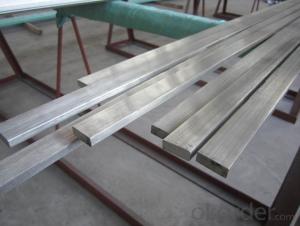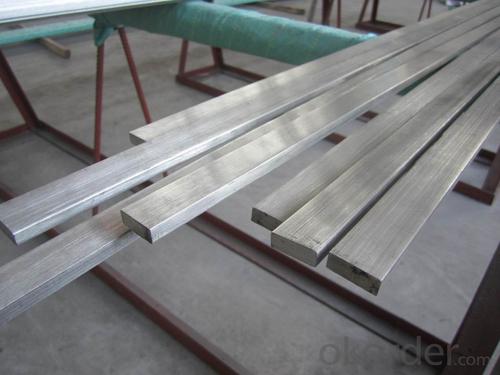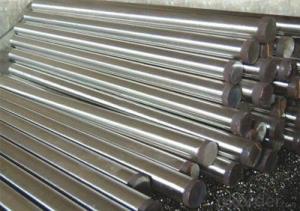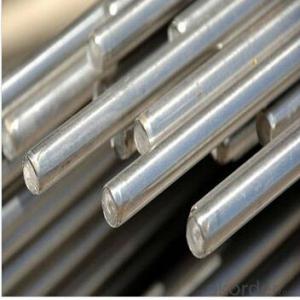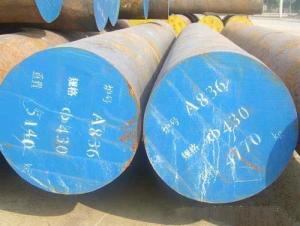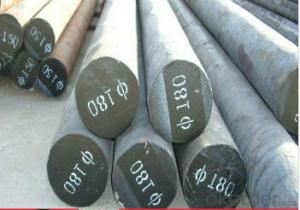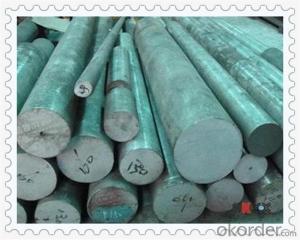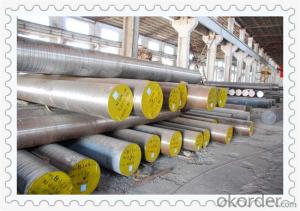SUP3 Spring Steel Alloy Round Bar and Plates
- Loading Port:
- Tianjin
- Payment Terms:
- TT OR LC
- Min Order Qty:
- 25 m.t.
- Supply Capability:
- 50000 m.t./month
OKorder Service Pledge
OKorder Financial Service
You Might Also Like
Specification
SUP3 Spring Steel Alloy Round Bar and Plates
Product Description:
1. Steel Grade: SUP3, 65Mn
2. Diameter: 16mm-300mm
3. Length: 6m,9m,12m
4. Shape: round bar, flat bar, square bar
5. Technique: Hot rolled, cold drawn, forged
Specification:
Material | 50Mn | Round bar | Dia(mm) | 16-600 |
Process | EAF + LF + VD + Forged + Heat Treatment (optional) | Length (mm) | Max 12000 | |
Heat treatment | Normalized / Annealed / Quenched / tempered | Flat bar | Thickness(mm) | 8-500 |
Delivery condition | Hot forged +Rough machined (black surface after Q/T)+ Turned (optional) | Width(mm) | 70-200 | |
Test | Ultrasonic test according to SEP 1921-84 D/d | Length (mm) | Max 12000 |
Chemical Composition:
C | Si | Mn | Cr | Ni | Cu |
0.5~0.8 | 0.17~0.37 | 0.25~1.2 | ≤0.25 | ≤0.30 | ≤0.25 |
Packing and Delivery:
Packing in bundle package or as your requriements.
Delivery Detail: About 45 days after confirming order.
Usage and Applications
1. Steel round bar is used in a large number of architectural and engineering structures. Or it can be used in construction of plants for the production of steel house frames, high-voltage transmission towers, bridges, vehicles, boilers, containers, ships, etc.
2. And we can use this kind of product on the performance of the mechanical parts if the demand is not very high.
3. Some especial material steel round bar can be used for main shaft of steamer, hummer shank, with big section and supper force.
Product Show:
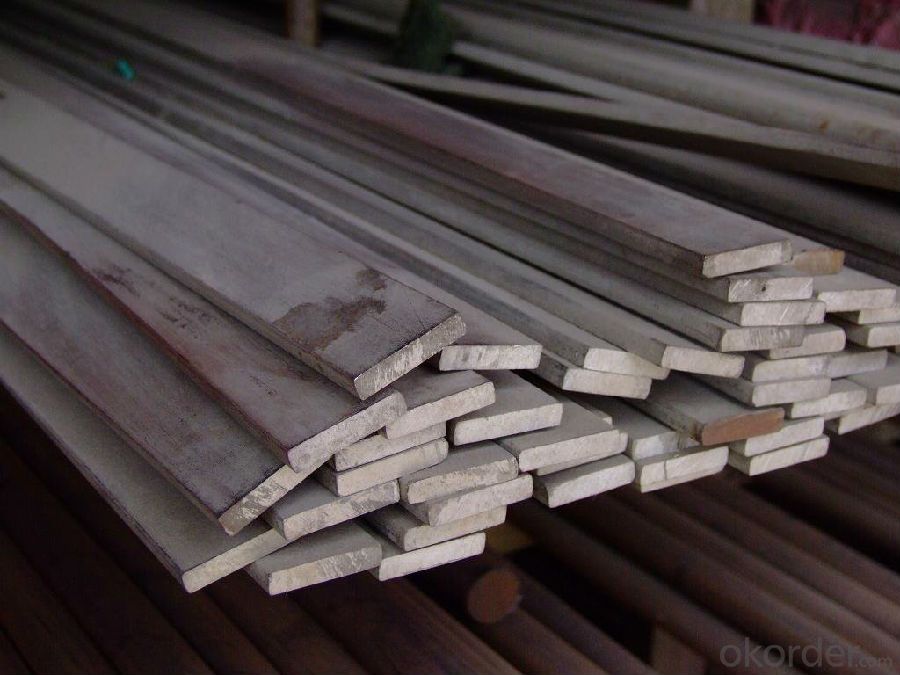
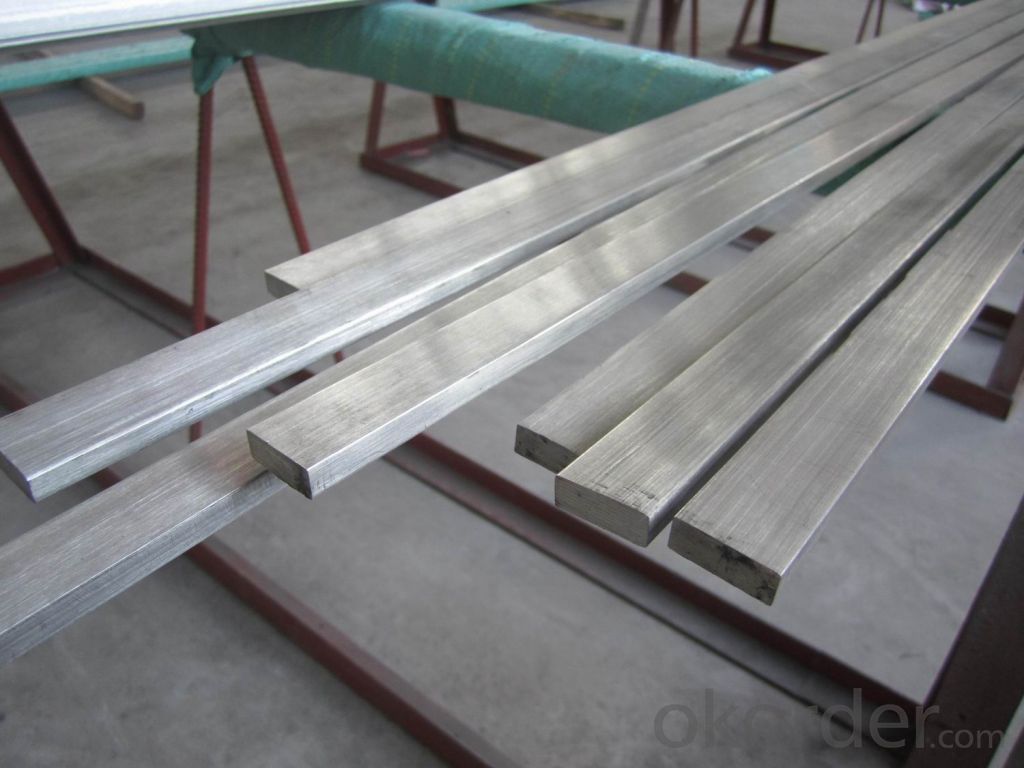
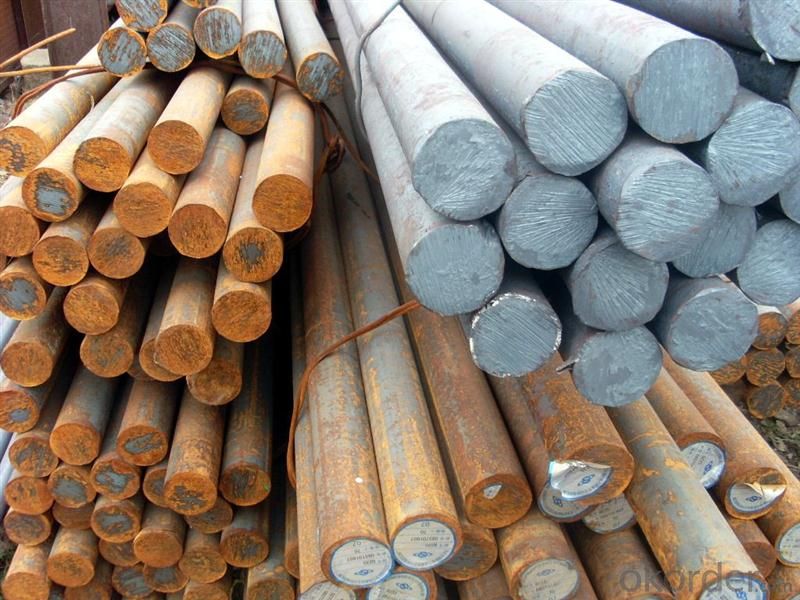
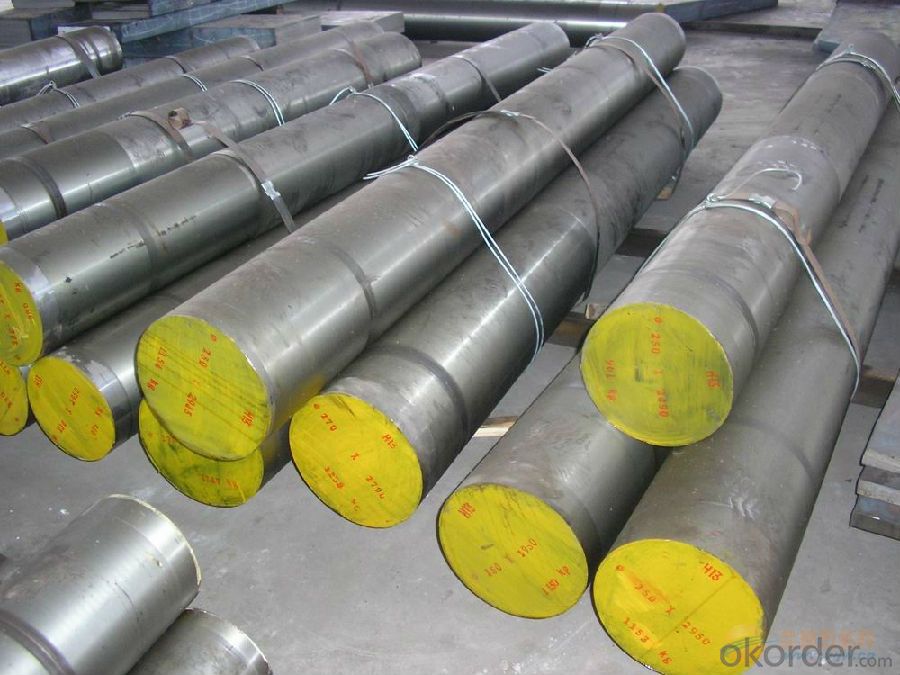
- Q: What are the specific requirements for special steel used in the oil and gas sector?
- The specific requirements for special steel used in the oil and gas sector are primarily focused on its ability to withstand harsh and demanding environments. Some of the key requirements include: 1. Corrosion Resistance: Special steel used in the oil and gas sector must have excellent resistance to corrosion caused by various factors such as moisture, chemicals, and high temperatures. This ensures the longevity and reliability of the equipment in corrosive environments. 2. High Strength: The steel must possess high strength and toughness to withstand the extreme pressure, stress, and load conditions experienced in oil and gas operations. This is crucial for ensuring the structural integrity of equipment like pipelines, offshore platforms, and drilling components. 3. Low Temperature Resistance: Oil and gas operations often involve working in extremely low-temperature conditions, especially in deep-sea exploration or Arctic regions. Special steel used in such applications must have good low-temperature toughness to prevent brittle fracture and maintain its mechanical properties. 4. Weldability: Special steel used in the oil and gas sector should exhibit good weldability to ensure ease of fabrication and construction. This is crucial for joining various components and pipelines together, ensuring structural integrity and minimizing the risk of failure. 5. Resistance to Hydrogen-Induced Cracking (HIC): In the presence of hydrogen sulfide gas, which is common in many oil and gas environments, special steel must have resistance to hydrogen-induced cracking. HIC can lead to catastrophic failures, so the steel must be specifically designed to prevent this phenomenon. 6. Sour Service Resistance: In certain oil and gas fields, the presence of hydrogen sulfide and other corrosive gases necessitates the use of special steel that can withstand sour service conditions. The steel must have high resistance to sulfide stress cracking and exhibit good mechanical properties under these harsh conditions. 7. Compliance with Industry Standards: Special steel used in the oil and gas sector must meet specific industry standards and specifications, such as those set by the American Petroleum Institute (API), to ensure quality, reliability, and safety. Overall, the requirements for special steel used in the oil and gas sector are driven by the need for durability, reliability, and safety in challenging operating environments. These requirements may vary depending on the specific application within the industry, but they are all critical for ensuring the smooth and efficient functioning of oil and gas operations.
- Q: What are the properties of tungsten alloys?
- Tungsten alloys possess several notable properties, including exceptional hardness, high melting point, excellent corrosion resistance, and remarkable density. These alloys are also known for their exceptional strength, resistance to wear, and ability to retain their shape even under extreme temperatures. Furthermore, tungsten alloys exhibit good electrical and thermal conductivity, making them suitable for various applications in industries such as aerospace, automotive, and defense.
- Q: How does special steel perform in high-pressure hydrogen environments?
- Special steel performs well in high-pressure hydrogen environments due to its high strength, corrosion resistance, and ability to withstand hydrogen embrittlement. It is specifically designed to resist the damaging effects of hydrogen, making it a reliable choice for applications in these environments.
- Q: What are the requirements for special steel used in battery technology?
- The requirements for special steel used in battery technology include high strength and durability, excellent corrosion resistance, good thermal conductivity, and compatibility with the specific battery chemistry. Additionally, the steel should have low impurity levels, good electrical conductivity, and be able to maintain its properties at high temperatures.
- Q: How is special steel used in the power generation industry?
- Special steel is used in the power generation industry for various applications such as turbine blades, generator shafts, and boiler tubes. The high strength, corrosion resistance, and heat resistance properties of special steel ensure efficient and reliable power generation. Additionally, special steel is used in the construction of power plant infrastructure, including pipelines and structures, to enhance durability and safety.
- Q: How is special steel used in the production of pressure vessels?
- Special steel is used in the production of pressure vessels due to its high strength, durability, and resistance to corrosion. It ensures the vessel can withstand high internal pressure and harsh operating conditions, ensuring safety and reliability.
- Q: How does special steel contribute to the dimensional stability of products?
- Special steel contributes to the dimensional stability of products through its unique properties and characteristics. One of the key factors is its high level of hardness, which allows it to resist deformation or changes in shape and size under varying temperature and load conditions. This hardness ensures that the product maintains its intended dimensions and shape, even when subjected to external forces or thermal fluctuations. Moreover, special steel often possesses excellent thermal conductivity, enabling it to efficiently distribute and dissipate heat. This property helps prevent localized heating or cooling, which can cause dimensional changes in materials. By maintaining consistent temperatures across the product, special steel minimizes the risk of warping, expansion, or contraction, thereby ensuring dimensional stability. Another aspect that contributes to dimensional stability is the low coefficient of thermal expansion of special steel. This coefficient measures the amount of expansion or contraction a material undergoes in response to temperature changes. Special steel's low coefficient means it experiences minimal dimensional changes when exposed to temperature variations. This characteristic is particularly crucial in applications where precise tolerances and tight dimensional control are required, such as in aerospace or automotive industries. Furthermore, special steel often possesses enhanced corrosion resistance, which helps prevent rusting or degradation of the material over time. Corrosion can lead to changes in the shape and dimensions of products, compromising their dimensional stability. By using special steel, manufacturers can ensure that their products maintain their original dimensions and structural integrity, even in harsh or corrosive environments. Overall, the unique properties of special steel, such as high hardness, excellent thermal conductivity, low coefficient of thermal expansion, and corrosion resistance, all contribute to the dimensional stability of products. By incorporating special steel into the manufacturing process, companies can produce high-quality products that maintain their precise dimensions and shape, ensuring reliability and longevity for end-users.
- Q: How does special steel contribute to the chemical resistance of products?
- Special steel, also known as stainless steel, contributes significantly to the chemical resistance of products due to its unique composition and properties. These steels contain a high percentage of chromium, which forms a thin, passive oxide layer on the surface of the steel. This oxide layer acts as a protective barrier, preventing corrosive substances from coming into direct contact with the steel and causing chemical reactions. The chromium in special steel forms a stable oxide layer that is highly resistant to corrosion, even in harsh chemical environments. This oxide layer is self-repairing, meaning that if it is damaged or scratched, it will quickly reform and continue to protect the steel. Additionally, the presence of other alloying elements such as nickel and molybdenum further enhances the chemical resistance of special steel. The chemical resistance of special steel extends to a wide range of corrosive substances, including acids, alkalis, and salts. This makes it highly suitable for applications in various industries such as chemical processing, pharmaceuticals, food processing, and marine environments. By using special steel in the manufacturing of products, the risk of chemical degradation and corrosion is significantly reduced. This leads to increased product lifespan, improved performance, and reduced maintenance costs. Furthermore, it ensures that the integrity and safety of the products are maintained, as chemical resistance is crucial in preventing leaks, contamination, and structural failures. In summary, special steel contributes to the chemical resistance of products by forming a protective oxide layer on its surface, which shields it from corrosive substances. Its unique composition and properties make it highly resistant to chemical degradation, ensuring the longevity and reliability of products in various industrial applications.
- Q: How is ultra-high-strength steel used in the construction industry?
- Ultra-high-strength steel is commonly used in the construction industry to enhance the structural integrity and resilience of buildings and infrastructure. Its exceptional strength-to-weight ratio allows for the creation of lighter and more durable structures. This steel variant is often employed in applications such as high-rise buildings, bridges, and offshore structures, where its superior strength properties provide increased safety and load-bearing capacity.
- Q: How is low alloy steel used in the manufacturing of pressure vessels?
- Low alloy steel is commonly used in the manufacturing of pressure vessels due to its excellent mechanical properties, including high strength, toughness, and corrosion resistance. These properties make low alloy steel ideal for withstanding high pressure and temperature conditions inside pressure vessels. Additionally, its weldability and formability allow for easier fabrication and assembly of pressure vessel components.
Send your message to us
SUP3 Spring Steel Alloy Round Bar and Plates
- Loading Port:
- Tianjin
- Payment Terms:
- TT OR LC
- Min Order Qty:
- 25 m.t.
- Supply Capability:
- 50000 m.t./month
OKorder Service Pledge
OKorder Financial Service
Similar products
Hot products
Hot Searches
Related keywords
